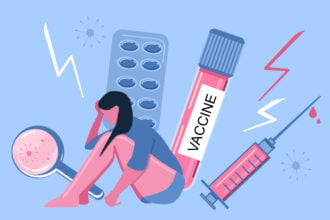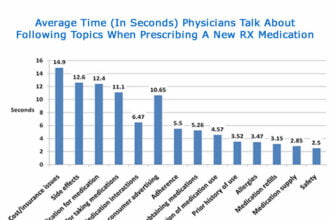For a few years now, I’ve been thinking about the potential intersections of genetics/genomics/proteomics and connected health. In fact, my colleague Kamal Jethwani and my daughter Julie coauthored a piece for the journal Personalized Medicine on the topic in 2010. A summary and the reference is linked. (I should also note that the figure I reproduced bel
For a few years now, I’ve been thinking about the potential intersections of genetics/genomics/proteomics and connected health. In fact, my colleague Kamal Jethwani and my daughter Julie coauthored a piece for the journal Personalized Medicine on the topic in 2010. A summary and the reference is linked. (I should also note that the figure I reproduced below is from that article with permission fromr the publisher.)
To learn more, I initially checked in with some local geneticists but their focus was on identifying genetic mutations in various cancers in order to predict therapeutic response. This fascinating area was recently discussed in the NEJM in a piece called Preparing for Precision Medicine. However, that is not exactly what I’ve been dreaming about. I was thinking more about the potential to identify folks with propensity towards chronic illnesses like obesity, diabetes and hypertension using genetic techniques. Then, getting these individuals on connected health programs in an effort to change the course of their personal health history, before they wound up with these often avoidable, costly conditions.
A couple of months ago I had an email and subsequent visit by George Church, the world-famous geneticist and founder of the Personal Genome Project. This conversation was pivotal for me as George is interested in collaborating with researchers who can track and map phenotype in such a way that we can match to genotype. Our team is meeting with him again this week and I’m looking forward to an exciting collaboration to emerge.
The intersection of connected health and genetics is interesting and complex terrain, and I am going to break up the discussion into several posts. Today I just want to introduce the concept of Personalized Prevention and get your reaction to it. Subsequently, there will be posts on some of the lifestyle diseases that have a genetic component and how we might use connected health to address those conditions. As a start, I want to make sure we are all on the same page as to the meaning of a couple of terms.
A person’s genotype is the manifestation of the DNA in their cells, i.e. genetic information. An individual’s phenotype is the expression of those genes in terms of proteins, cell behavior and ultimately human traits and behaviors. Some time ago, the visionaries in the world of genetics coined the term personalized medicine to refer to the idea that if we know your genotype, we can be precisely predictive of your risk of getting certain diseases, as well as your response to certain therapeutics.
The $1000 genome is nearing reality. As a society, we’ve not yet begun to appreciate what this means. There are all sorts of implications but the most mind-bending is the idea that we will eventually be able to create diagnoses that are unique to you and therapeutic responses that are equally unique.
Consider that we are constantly bombarded with messaging about health care that goes like this: “40% of patients had a positive response as compared to placebo.” This sounds like a triumph at the population level, but what if you are one of the 60% that would not respond and we could predict that? One of my professors was prescient on this matter back in the ‘70s and said, “Patients don’t really care what their percent likelihood of an outcome is. For them, the outcome is 100% success or failure and they’d like to be able to predict it on that binary level.” Until very recently we’ve only been able to offer patients a sense of risk, but the time is coming where we will be able to be much more confident in our choices for them.
Connected health does this too. It is the ‘phenotypic map’ that corresponds to the detailed ‘genotypic map’ the geneticists come up with. Consider if we have a population of workers and we want to incent them to be more active. Connected health can provide, at a minimum, a very precise measurement of the outcome. It enables folks who are investing in the program to see — both at a population and individual level — whether the program is resulting in increased activity.
Healthrageous has had success with this in the employer/health plan market. They are giving customers precise data on how their populations respond to various incentives and programs to increase activity and lower blood pressure. The company will be moving next into diabetes. Healthrageous can measure a program’s success quite precisely, reporting % engagement, % that stick with the program through the end and % achieving clinically significant results. In all cases, they are creating new industry norms, but equally exciting is the precision of their reporting.
The illustration below lays out the concept of Personalized Prevention graphically. Individuals who are at risk to develop a chronic illness can be identified, then offered connected health programs as a tool to prevent progression. Likewise, individuals who are not responding to connected health programs can be identified as candidates for genetic testing to uncover the reasons why not.
I think the best example of how this might work is for people who are overweight or obese. There is now good evidence that people who gain weight reset their satiety thermostat, i.e., when they lose weight even to a previously low weight, their body sends their brain a signal that they are chronically hungry, as if trying to get them back to their overweight state. Tara Parker-Pope covered this wonderfully in a recent NY Times Magazine article called The Fat Trap.
I’ll write more on this next time, but to me it makes great sense to try to identify folks at risk for weight gain and educate them about activity using smart pedometers. The feedback loops that connected health provides allow for an intense education into how one can easily increase activity. It seems that, knowing there is a risk of weight gain, and knowing that this extra weight would be incredibly hard to take it off, an individual might be motivated to sign up for an activity monitoring program. Finding the right motivational triggers is, in part, how we create Personalized Prevention.
So what do you think? Does the concept of Personalized Prevention make sense?







